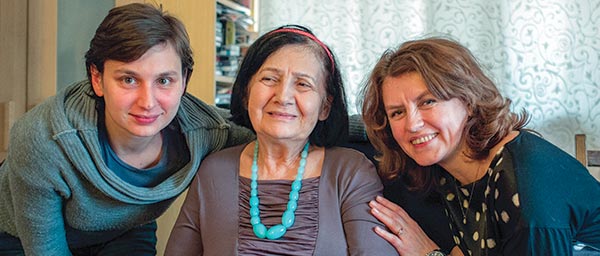Claims Conference Allocating $365 Million for Aid to Holocaust Victims for 2015
Claims Conference in the Media | Press Inquiries | Publications | Videos | Updates
 Funding Provides Homecare, Medical Care, Food and Other Help in 47 Countries
Funding Provides Homecare, Medical Care, Food and Other Help in 47 Countries
Elderly Jewish Holocaust victims, the last of their generation to have endured the horrors of the Nazi genocide, will receive significantly more aid in 2015.
In 2015, total Claims Conference allocations to social service organizations around the world will total $365 million, an increase of $80 million — 21 percent — over the 2014 amount, and will aid Holocaust victims in 47 countries. The money is used primarily for homecare, the top social welfare priority for these survivors, but is also used for hunger relief, medical care, winter aid, transportation and other vital needs.
The Claims Conference is the only organization assisting Holocaust survivors worldwide, initiating and funding homecare programs and other vital services specifically for Nazi victims.
“All Shoah victims should be able to receive the help and support that they need to live the rest of their lives in dignity, after having endured indescribable suffering in their youth,” said Claims Conference President Julius Berman. “This tremendous increase in funding will directly help many survivors, including those who need more help at home than they currently receive as well as those needing care for the first time. Abandoned by the world in their youths, Holocaust victims deserve all the aid and comfort that it is possible to give them in the twilight of their lives.”
The increase stems from Claims Conference negotiations with Germany, where support for homecare has been an urgent priority for more than a decade. With this substantial increase in allocations, the Claims Conference will be able to provide more help for the essential and special needs of Holocaust victims, which continue to increase as they age.
In addition to German government funding, Claims Conference allocations derive from proceeds from recovering Jewish properties in the former East Germany, the Harry and Jeanette Weinberg Foundation, the Austrian government and the Swiss Banks Settlement.
These allocations are entirely separate from the individual compensation payments also distributed by the Claims Conference to Holocaust victims.
It is important to understand that while the number of Jewish victims of Nazism dwindles every year, the day-to-day needs of the aging and ever frailer victims continue to increase. In 2013, the Claims Conference brought this message to its annual negotiations with the German government. The resulting agreement yielded a landmark $1 billion sum to be allocated by the Claims Conference through 2017.
“This agreement was finalized in 2013, a time of budget austerity in Germany, making it all the more significant,” said Ambassador Stuart Eizenstat, Claims Conference Special Negotiator. “We thank Germany for recognizing and continuing to address its historic obligation to Holocaust victims.”
In 2015, the additional allocations mean that certain Jewish social welfare agencies will see their annual grants double or more.
Homecare funded by Claims Conference allocations encompasses a wide variety of services, intrinsic to enabling survivors to remain living in their own homes, in familiar surroundings, affording them a sense of safety, security, comfort and community. Some survivors need assistance such as light housekeeping and cooking, while others, more infirm, require help with the basic activities of daily living, such as dressing and hygiene. The additional funding for 2015 will be used for all of these purposes.
This remarkable increase in funding will enable Jewish social service agencies to continue to support those survivors already receiving homecare assistance, as well as survivors who find themselves in need, for the first time, of homecare help. Funding for 2015, to social service organizations working with survivors, is based on the projected unmet needs that such organizations have reported to the Claims Conference.
December 15, 2015

